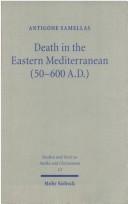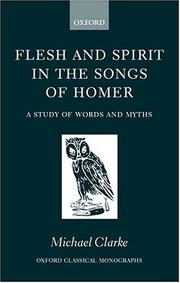| Listing 1 - 6 of 6 |
Sort by
|
Book
ISBN: 9781032043050 Year: 2021 Publisher: Abingdon, Oxon New York, NY Routledge
Abstract | Keywords | Export | Availability | Bookmark
 Loading...
Loading...Choose an application
- Reference Manager
- EndNote
- RefWorks (Direct export to RefWorks)
"This collection of essays explores the rhetoric and practices surrounding views on life after death and the end of the world, including the fate of the individual, apocalyptic speculation and hope for cosmological renewal, in a wide range of societies from ancient Mesopotamia to the Byzantine era. The 42 essays by leading scholars in each field explore the rich spectrum of ways in which eschatological understanding can be expressed, and for which purposes it can be used. Readers will gain new insight into the historical contexts, details, functions and impact of eschatological ideas and imagery in ancient texts and material culture from the 25th century BCE to the 9th century CE. Traditionally, the study of 'eschatology' (and related concepts) has been pursued mainly by scholars of Jewish and Christian scripture. By broadening the disciplinary scope but remaining within the clearly defined geographical milieu of the Mediterranean, this volume enables its readers to note comparisons and contrasts, as well as exchanges of thought and transmission of eschatological ideas across antiquity. Cross-referencing, high quality illustrations, and extensive indexing contribute to a rich resource on a topic of contemporary interest and relevance. Eschatology in Antiquity is aimed at readers from a wide range of academic disciplines, as well as non-specialists including seminary students and religious leaders. The primary audience will comprise researchers in relevant fields including Biblical Studies, Classics and Ancient History, Ancient Philosophy, Ancient Near Eastern Studies, Art History, Late Antiquity, Byzantine Studies and Cultural Studies. Care has been taken to ensure that the essays are accessible to undergraduates and those without specialist knowledge of particular subject areas"--
Book
Abstract | Keywords | Export | Availability | Bookmark
 Loading...
Loading...Choose an application
- Reference Manager
- EndNote
- RefWorks (Direct export to RefWorks)
Book
ISBN: 9780199370252 0199370257 Year: 2015 Publisher: New York, NY Oxford University Press
Abstract | Keywords | Export | Availability | Bookmark
 Loading...
Loading...Choose an application
- Reference Manager
- EndNote
- RefWorks (Direct export to RefWorks)
War --- Combat in the Bible --- Eschatology, Ancient --- Mythology --- Middle East --- Religion.

ISBN: 3161476689 Year: 2002 Publisher: Tübingen : Mohr Siebeck,
Abstract | Keywords | Export | Availability | Bookmark
 Loading...
Loading...Choose an application
- Reference Manager
- EndNote
- RefWorks (Direct export to RefWorks)
Funeral rites and ceremonies, Ancient --- Death --- Church history --- Eschatology, Ancient. --- Funérailles --- Mort --- Eglise --- Eschatologie ancienne --- Religious aspects. --- Rites et cérémonies --- Histoire --- Aspect religieux --- 393 <4-015> --- Dood. Dodengebruiken. Dodenritueel. Lijkverbranding. Begrafenis. Crematie. Rouw. Opbaren. Lijkstoet. Sterven. Dodenmaskers--Middellandse-Zeegebied --- 393 <4-015> Dood. Dodengebruiken. Dodenritueel. Lijkverbranding. Begrafenis. Crematie. Rouw. Opbaren. Lijkstoet. Sterven. Dodenmaskers--Middellandse-Zeegebied --- Funérailles --- Rites et cérémonies --- Christianity --- Eschatology, Ancient --- Ancient funeral rites and ceremonies --- Eschatology --- Intermediate state --- Apostolic Church --- Church, Apostolic --- Early Christianity --- Early church --- Primitive and early church --- Primitive Christianity --- Fathers of the church --- Great Apostasy (Mormon doctrine) --- Religions --- Influence --- Religious aspects

ISBN: 0198152639 Year: 1999 Publisher: Oxford : Clarendon Press,
Abstract | Keywords | Export | Availability | Bookmark
 Loading...
Loading...Choose an application
- Reference Manager
- EndNote
- RefWorks (Direct export to RefWorks)
Epic poetry, Greek --- Mythology, Greek, in literature. --- Soul in literature --- Body and soul in literature. --- Eschatology, Ancient --- Greek language --- Psychology in literature. --- Self in literature. --- Poésie épique grecque --- Mythologie grecque dans la littérature --- Ame dans la littérature --- Esprit et corps dans la littérature --- Eschatologie ancienne --- Grec (Langue) --- Psychologie dans la littérature --- Moi dans la littérature --- History and criticism. --- Etymology. --- Histoire et critique --- Etymologie --- Homer --- Criticism and interpretation. --- Knowledge --- Psychology. --- Future life in literature. --- Spiritual life in literature. --- Poésie épique grecque --- Mythologie grecque dans la littérature --- Ame dans la littérature --- Esprit et corps dans la littérature --- Psychologie dans la littérature --- Moi dans la littérature
Book
ISBN: 3837642364 3839442362 Year: 2019 Publisher: Bielefeld, Germany transcript Verlag
Abstract | Keywords | Export | Availability | Bookmark
 Loading...
Loading...Choose an application
- Reference Manager
- EndNote
- RefWorks (Direct export to RefWorks)
Since the dawn of humanity, people have developed concepts about themselves and the natural world in which they live. This volume aims at investigating the construction and transfer of such concepts between and within various ancient and medieval cultures. The single contributions try to answer questions concerning the sources of knowledge, the strategies of transfer and legitimation as well as the conceptual changes over time and space. After a comprehensive introduction, the volume is divided into three parts: The contributions of the first section treat various theoretical and methodological aspects. Two additional thematic sections deal with a special field of knowledge, i.e. concepts of the moon and of the end of the world in fire. »The book will mainly appeal to intellectual historians of antiquity, who will appreciate the case studies of ancient knowledge.« T. Farmer, Choice, 57/8 (2020)
Social & cultural history --- Ancient History. --- Cultural History. --- Eschatology. --- History of Astronomy. --- History. --- Knowledge Transfer. --- Medieval History. --- Middle Ages. --- Universals. --- Antiquity; Middle Ages; Knowledge Transfer; Universals; Cultural History; History of Astronomy; Eschatology; Ancient History; Medieval History; History --- Technology and civilization --- Civilization --- Knowledge, Theory of --- Technology transfer --- History --- Technological transfer --- Transfer of technology --- Diffusion of innovations --- Inventions --- Research, Industrial --- Technology and international relations --- Foreign licensing agreements --- Technological forecasting --- Technological innovations --- Technology --- Epistemology --- Theory of knowledge --- Philosophy --- Psychology --- Barbarism --- Civilisation --- Auxiliary sciences of history --- Culture --- World Decade for Cultural Development, 1988-1997 --- International cooperation --- Antiquity, Middle Ages --- Knowledge Transfer --- Universals --- Cultural History --- History of Astronomy --- Eschatology --- Ancient History --- Medieval History
| Listing 1 - 6 of 6 |
Sort by
|

 Search
Search Feedback
Feedback About UniCat
About UniCat  Help
Help News
News